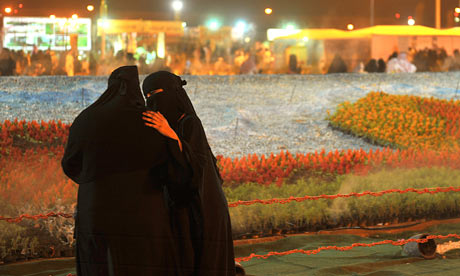… But even when they graduate most of the women won't be able to work

Saudi women cannot go out without male permission. Photograph: Fayez Nureldine/AFP
The world's largest women-only university was opened barely two weeks ago by King Abdullah of Saudi Arabia. Situated on the outskirts of the capital, Riyadh, the Princess Nora bint Abdulrahman University is ambitious – it has the capacity for 50,000 students and will improve women's access to courses such as business and science. It has a teaching hospital, laboratories and libraries.
Which is all very nice (if you forget for the moment the kingdom's strict sex-segregation rules). The question is, what happens to these women after they graduate? Many Saudi women are already well-educated, but women make up less than 15% of the labour force – and earn far less than men.
"We would need to assess whether this new facility will open up more male-dominated fields to women," says Nadya Khalife, from Human Rights Watch.
The World Economic Forum global gender gap report in 2010 ranked Saudi Arabia 129 out of 134 countries, and the only country to score a zero for female political empowerment; in March, it was announced that the ban on Saudi women voting would continue. Saudi women are forced to live under the control of a male guardian, usually a father or husband, without whose authority they cannot get a job, travel or open a bank account. They cannot leave the house alone or without wearing the niqab, and are banned from driving a car.
"Ensuring women's rights in Saudi Arabia is not about opening larger universities, it's really about ensuring that women are allowed to study all fields and to be able to find future employment in these fields," says Khalife. "The way in which Saudi Arabia segregates men and women in employment makes it very difficult for women to enter certain jobs. The Saudi government made promises, for instance, about ensuring that female lawyers, who are allowed to work only in administrative jobs, take up court cases, but there still has been no decision. While the opening of a large university is an indication of Saudi's interest in educating women, it has to do much more to lift restriction on women's employment."

No comments:
Post a Comment